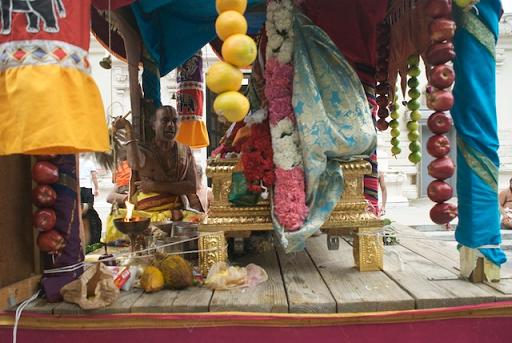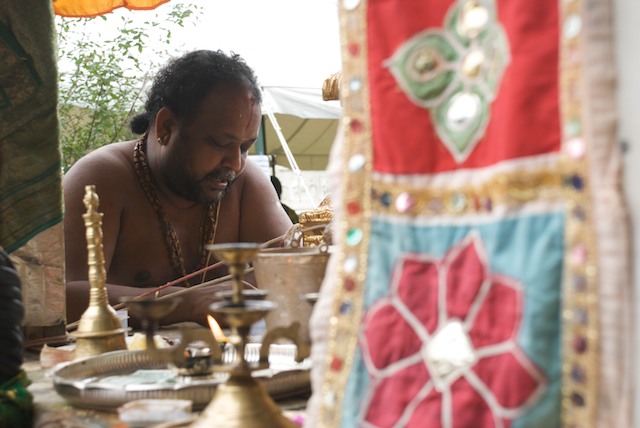Contribute
| Caught Between Cultures: Bhutanese Refugees Visit Ashland Temple |
Shoba Narayana
08/05/2009
Ashland’s Sri Lakshmi Temple is having a Bramhotsavam celebration today and the chariot with decorated Vigraham of Lord Vishnu and his cohort, Goddess Lakshmi, stands halted in the middle of the road on the temple grounds. A Hindu priest sits atop the chariot next to the Deities bestowing God’s blessings to devotees. Today the crowd of devotees is different. My eyes follow an elderly woman whose head is draped in a vividly orange prayer shawl and her face holds the history of a story older than me. She approaches the priest to receive blessings and she places red kumkum upon her forehead. Although she does not know any of the people that are regulars within the community, she is connected to this ground through her spirituality. She walks slowly back to a group of very colorfully dressed people sitting by the playground on the grass. There are about 100 in total gathered today and they make up a small population of Bhutanese refugees living in the Worcester area. The Sri Lakshmi Temple extended the invitation and transportation to this community to spend time at the Hindu temple and to take comfort in the religion that connects them to the distant memory of their home thousands of miles away.
For these refugees, it is has been an extremely treacherous and traumatic journey starting with a struggle that dates back to eighteen years ago. These refugees are Bhutanese people of Nepalese descent who were forced from Bhutan under the ‘One nation, one people’ policy led by Bhutan’s former King Jigme Singye Wangchuck. Ethnic Nepalese, mainly originating from the South, were not accepted and were forced to leave, even after a century of living in this land that was their home.
Purnanand Neupane left Bhutan in 1992: “The army officers were harassing us and threatening to kill if we did not leave. They would take our sisters and mothers and rape them in the barracks. My own sister had no choice but to leave in the middle of the night because otherwise the offices were going to close the door and set the house on fire. She left on the day my mother died. When I returned from my college, I had to perform the ritual for thirteen days but I could hardly complete the puja. The priest would come in the middle of the night and then run back out into the jungle. He feared the officers would arrest him.â€
Neupane joined the 100,000 refugees that sought asylum in Nepal. Although space was granted for the seven refugee camps, in all the eighteen years of living there, they were never accepted into the society but, rather, were branded with the identity of “refugee.†Neupane describes the life in the camps as “monotonous and suffocating. There was no destination, no future, no identity. It was as if we were hanging in the middle.†There was no proper education for children due to a lack of qualified teachers. He also tells me of the clashes between locals and the refugees over a lack of jobs. Within the camps there was gang violence that was at times fatal. The living situation overall was extremely grim. Neupane reflects on the lack of proper food and medical supplies which led to malnutrition and the rapid spread of disease. The close proximity of the thatched roof huts led to many quick spreading fires especially during the dry season.
With no hope of returning to their homeland or any hope of being able to assimilate into Nepal, the refugees, with the help of the United Nations High Commissioner for Refugees, were given the opportunity to resettle in a third country. The United States and six other nations offered to take them in. Since last year, the U.S. has begun the process of resettling up to 60,000 refugees in various cities across the nation.
Today Neupane works as a case manager with the Lutheran Social Services in order to provide care for the refugee community. He tells me that that major challenges for the refugees is communication in the English language and also learning how the system works here in terms of navigating finances and medical care. The U.S. is providing cash assistance and food stamps for eight months after which the refugees will be on their own. Neupane connects the community with different groups, such as the Sri Lakshmi Temple, so that the refugees will not feel that their religion and culture is completely lost. He has recognized that it is most difficult for the teenagers and young adults: “They have a hard time assimilating into the school system and feel very lonely.†Those that are not educated enough to attend college and are too old to go into school, ages 18-22, need to find an outlet for acquiring job skills. Neupane has already witnessed the slow seepage of drugs and alcohol into this section of the community and he is working to try and find alternatives to empower these youths.
What draws me to their story is the concept of being ‘caught between cultures.’ This is a theme that has always followed me throughout my life as a first generation Indian American. I cannot imagine what it would be like to be stripped of your identity as a Bhutanese citizen, leaving the only place known as home to shift to another hostile environment in the Nepalese refugee camps and now living in a country where the culture, language and way of living is completely different. It makes me wonder about the different generations and what their perspectives would be; the grandmother who grew up knowing the old ways in the isolated land of Bhutan; the young adults who were born and raised in the Nepalese refugee camps and only know of Bhutan through their parents, and the younger children and soon to be born children who will assimilate more into American culture. I hope that the Indian community can embrace this group and connect to them through sharing the immigrant experience.
Although there is a rough road ahead for this community, I see faith in their eyes and gratefulness for getting the opportunity to live in a country that has welcomed them. Neupane leaves me with these beautiful words which make me appreciate being a U.S. citizen despite the host of problems in our society: “I was in a country, a garden, that wanted to plant one kind of flower. But now I’m in a garden that wants to plant varieties of flowers and all can bloom here with equal opportunity.â€
You may also access this article through our web-site http://www.lokvani.com/



More Pictures